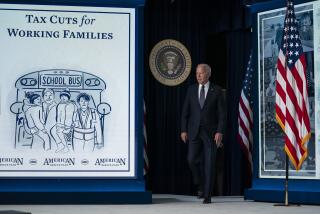Bush Wants Action on Child Credit
- Share via
WASHINGTON -- Stepping up pressure on balky House Republicans, the White House said Monday that President Bush wants to quickly sign legislation that would provide relief for low-income families that will not benefit from the new tax cut law.
White House spokesman Ari Fleischer, in comments that could undercut the efforts of GOP House leaders to link low-income relief to a broader tax cut bill, indicated that Bush preferred a less controversial Senate version to get the measure enacted as soon as possible.
“His advice to the House Republicans is to pass [the Senate bill], to send it to him so he can sign it,” Fleischer said. “He understands they’re going to take a look at some other tax matters.... But he wants to make certain that this does not get slowed down, bogged down. He wants to sign it.”
Fleischer’s remarks, the White House’s first extensive comments on the issue, signaled that Bush wants to dampen a controversy that flared after he signed the $350-billion tax cut package in late May.
The law immediately increased from $600 to $1,000 the tax credit millions of middle-income families can take for each child. But it gave no per-child benefit to families making too little to pay federal income taxes -- even though such benefits, in the form of direct checks, were to be provided in the years to come under the tax cut law pushed through Congress in 2001.
That omission was supported by conservatives who want to target relief on those who pay federal income taxes. But it sparked intense criticism from Democrats and liberal activists, who argued that the working poor -- who pay other kinds of taxes -- deserved relief as well.
Bowing to criticism, the Senate last week passed a bill that would provide families earning from $10,500 to $26,625 annually with federal checks comparable to the tax credit for the more affluent, beginning with checks of up to $400 this year.
The bill also included a new benefit for upper-income families, by increasing to $150,000 from $110,000 the income level at which eligibility for the per-child credit begins to phase out.
To pay for the $10.5 billion the bill would cost, the Senate measure proposes extending customs fees that are due to expire.
The bill passed the Senate 94 to 2. Despite that overwhelming support, House Republicans have said they would not rubber-stamp the measure simply to quell liberal criticism.
House Majority Leader Tom DeLay (R-Texas) said he would consider expanding the child credit only as part of broader tax cut legislation. House GOP leaders have been preparing a measure that could cost $80 billion or more over the next decade; it would probably include a provision to make permanent the $1,000 credit, which is scheduled to drop to $700 in 2005.
Fleischer on Monday said, “We’ll work with the House, the House’s ideas, but the president thinks at its core, what the Senate has done is the right thing.”
Stuart Roy, a DeLay spokesman, said he was encouraged that the White House remained open to new House ideas, though Bush expressed a clear preference for the Senate approach.
Other GOP strategists said privately that Fleischer made plain that Bush was more interested in settling the child credit issue than in using it to advance a broader tax cut agenda.
One senior House aide complained that the White House was reacting too defensively to the flap. And the aide suggested the House may not proceed on child credit legislation as swiftly as the White House would like, saying, “We are going to do this methodically and do the right thing and cut taxes for people who pay taxes.”
Bush did not include the low-income aid in his original $725-billion, 11-year proposal to stimulate the economy, which he unveiled in January. Asked why he supports it now, Fleischer said, “These are all important priorities to the president.”
Proponents of the Senate bill have been urging the House to act quickly to allow the checks to low-income people to be mailed along with those going to other taxpayers. But the Treasury Department said in a statement Monday that would not be possible. Under the new law, 25 million child credit refunds will be mailed beginning in late July.
Times staff writer Edwin Chen contributed to this report.
More to Read
Get the L.A. Times Politics newsletter
Deeply reported insights into legislation, politics and policy from Sacramento, Washington and beyond. In your inbox twice per week.
You may occasionally receive promotional content from the Los Angeles Times.










